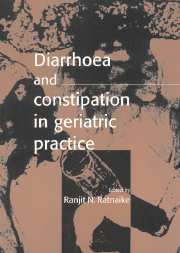Book contents
- Frontmatter
- Contents
- List of contributors
- Preface
- Acknowledgments
- Foreword by Gary R. Andrews
- I Defences of the aging gastrointestinal tract
- II Diarrhoea
- III Noninfectious clinical entities
- 11 Coeliac disease
- 12 Inflammatory disorders of the colon
- 13 Neoplasia and diarrhoea
- 14 Irritable bowel syndrome
- 15 Endocrine, metabolic and miscellaneous causes of diarrhoea
- IV Constipation
- V Perspectives of altered bowel function
- Index
12 - Inflammatory disorders of the colon
Published online by Cambridge University Press: 17 August 2009
- Frontmatter
- Contents
- List of contributors
- Preface
- Acknowledgments
- Foreword by Gary R. Andrews
- I Defences of the aging gastrointestinal tract
- II Diarrhoea
- III Noninfectious clinical entities
- 11 Coeliac disease
- 12 Inflammatory disorders of the colon
- 13 Neoplasia and diarrhoea
- 14 Irritable bowel syndrome
- 15 Endocrine, metabolic and miscellaneous causes of diarrhoea
- IV Constipation
- V Perspectives of altered bowel function
- Index
Summary
Introduction
Of several inflammatory disorders of the colon, ulcerative colitis and Crohn's disease are important causes of diarrhoea of moderate or greater severity in developed countries. The clinical manifestations of these disorders in the elderly will be the major focus of this chapter.
Other inflammatory disorders of the colon which can cause diarrhoea, such as ischaemic colitis, diverticulitis, collagenous colitis and pneumatosis coli, will be reviewed briefly since they are predominant in the elderly. Radiation colitis (see Chapter 15), pseudomembraneous colitis (see Chapter 8) and amoebic colitis (see Chapter 8) are discussed elsewhere.
In ulcerative colitis and Crohn's disease, care must be taken with the extrapolation of old data to current clinical outcomes. For example, early data suggested that ulcerative colitis in the elderly often pursued an aggressive course with a poor response to medical therapy and a high perioperative mortality. These observations have not been supported by more recent studies. Reasons for these discrepancies may include nonrecognition of mild forms of inflammatory bowel disease and diagnostic errors in some patients subjected to surgery. For example, the clinical features of Crohn's colitis and ischaemic colitis were only clearly defined in 1960 and 1963, respectively.
Ulcerative colitis and Crohn's disease
Epidemiology
The prevalence of ulcerative colitis and Crohn's disease in various populations, changes in prevalence rates with time and the identification of environmental factors which may predispose to inflammatory bowel disease, have been addressed in various studies.
Information
- Type
- Chapter
- Information
- Diarrhoea and Constipation in Geriatric Practice , pp. 139 - 153Publisher: Cambridge University PressPrint publication year: 1999
